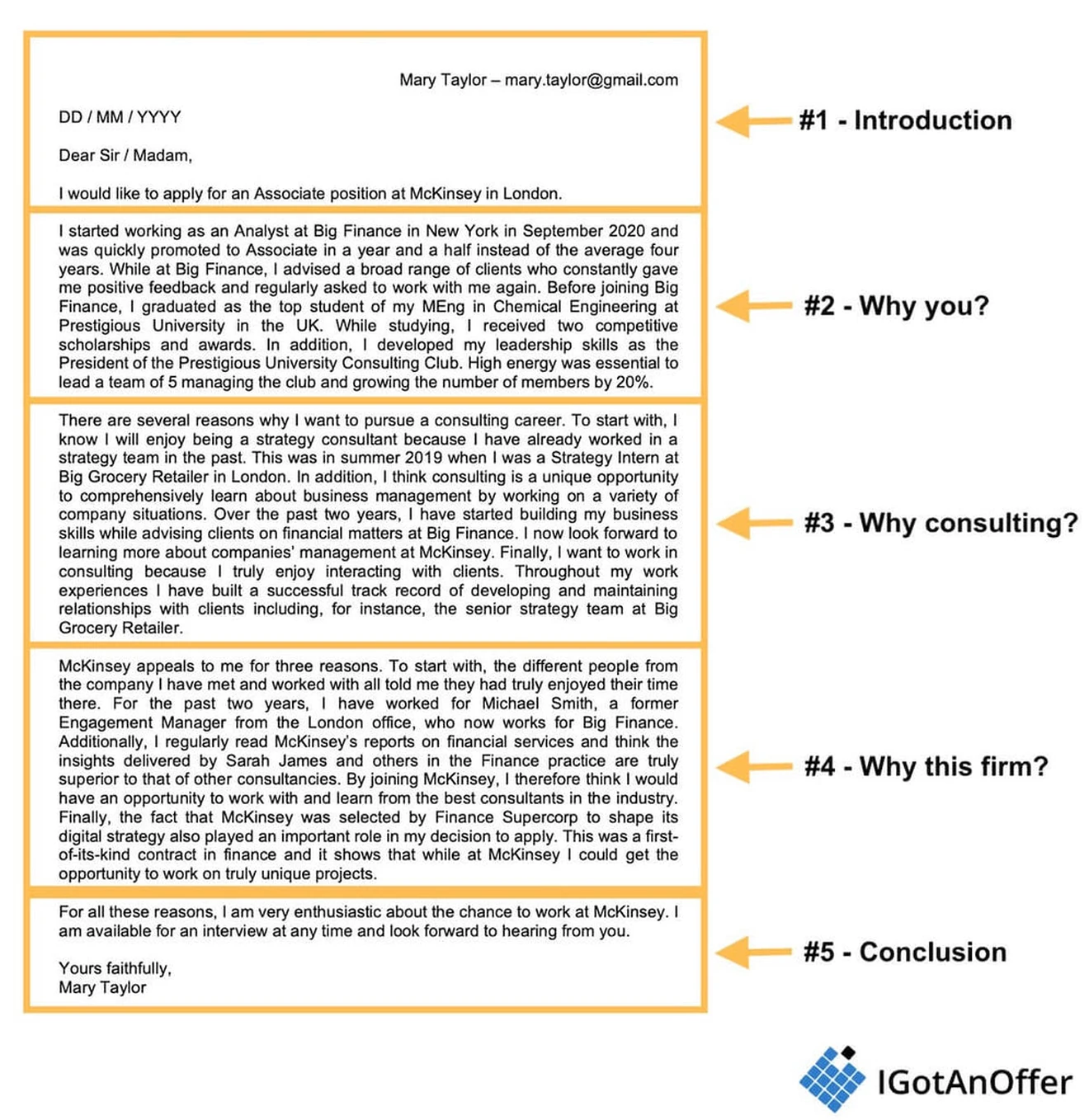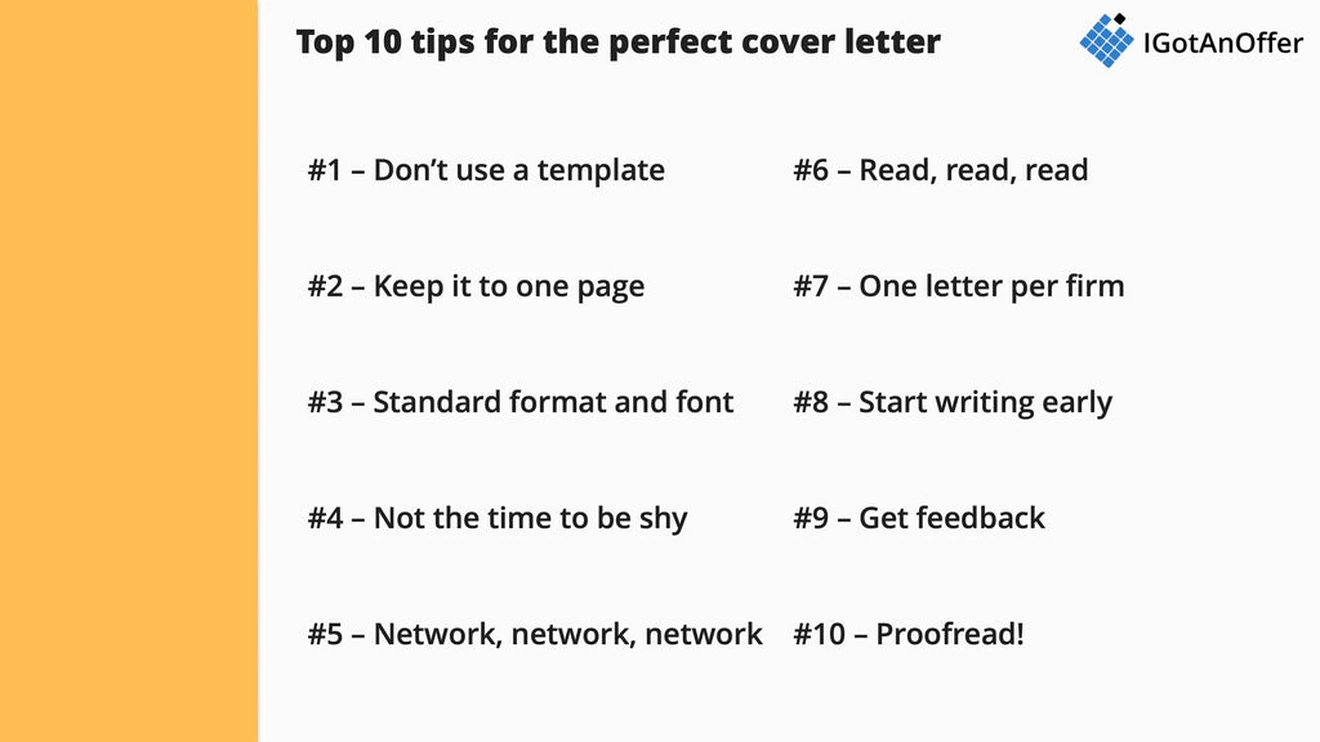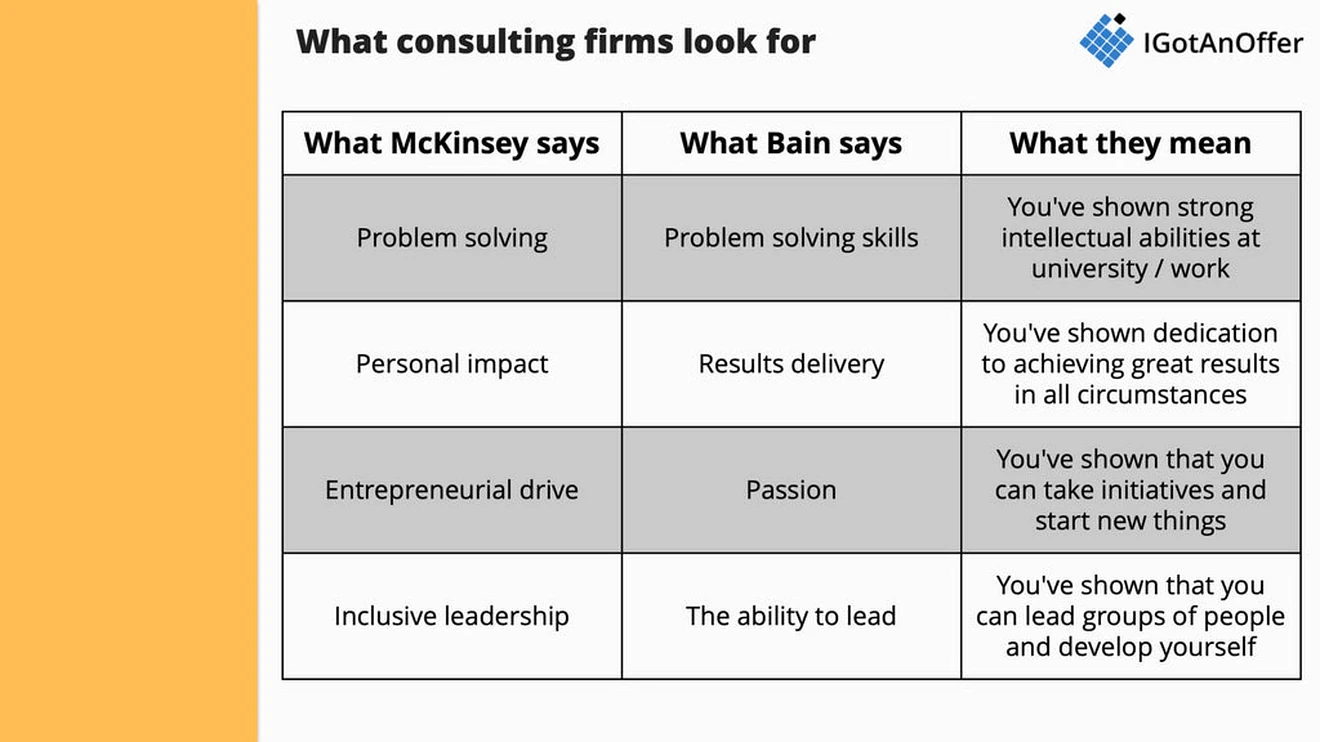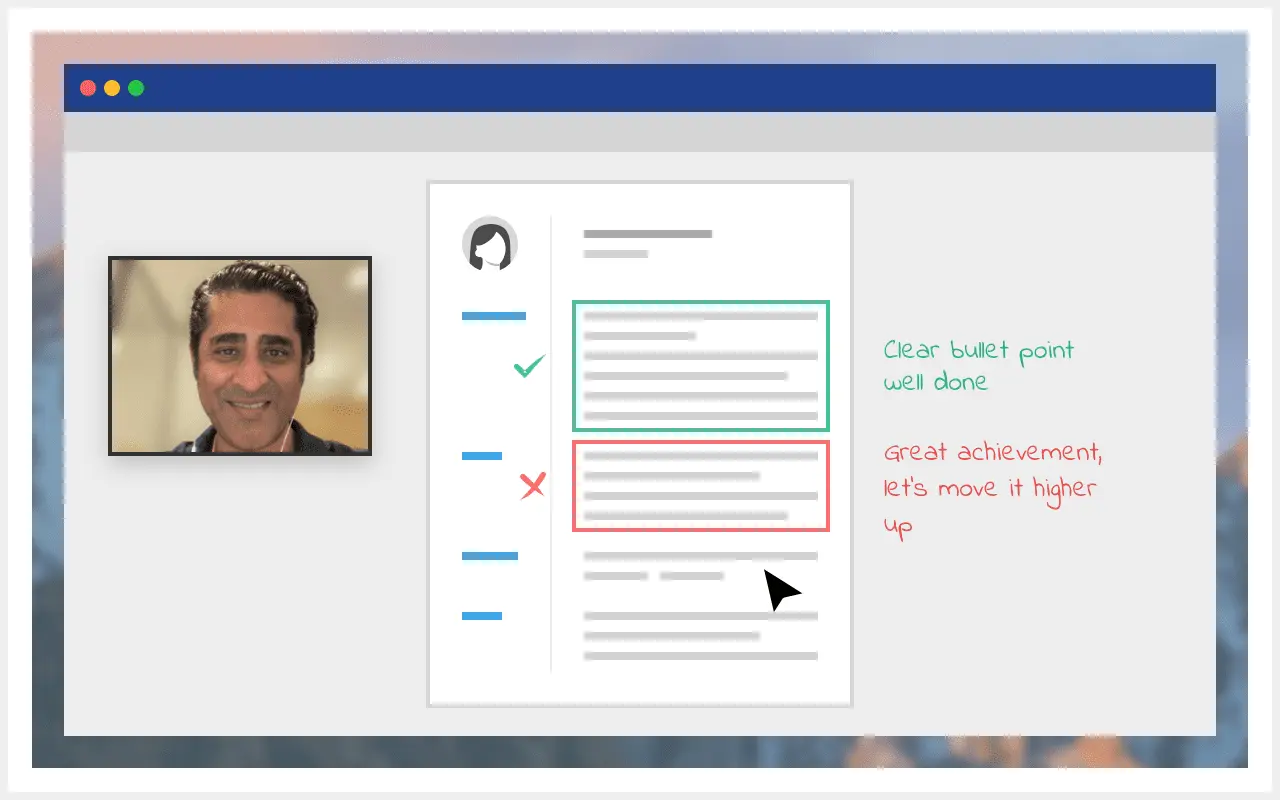Today we’re going to explain everything you need to know about writing consulting cover letters.
We’ll start by reviewing an example cover letter that got interview invitations from ALL the MBB firms (McKinsey, BCG, and Bain).
And then we’ll explain exactly how you should write your own cover letter to land consulting interviews. Here’s a full list of the topics in this guide:
- Example cover letter
- How to write your consulting cover letter
- Consulting cover letter tips
- The skills consulting firms look for
- Consulting cover letter screening process
- Get help with your cover letter
Let’s get to it!
Click here for a consulting letter/resume review with an ex-MBB consultant
Example cover letter (which got interviews at McKinsey, BCG, and Bain)
Below is an anonymised cover letter from a candidate who got interviews at McKinsey, BCG, and Bain. So you can trust that this template works.
The image here highlights the different sections of the cover letter, but we’ll dive deeper into the text later, and you can also get a downloadable copy below.

Free download of the consulting cover letter example, here.
In the next section, we’ll go step-by-step through each part of the cover letter and explain how to go about writing it. But before we dive in, please note the following points about the above template:
- A lot of people use this template. Get inspiration from it, but every sentence in your letter should be written from scratch.
- This cover letter might sound impressive. It's one of the best ones we’ve seen. But even if you have not achieved as much as this person, you can still get an interview.
With that said, let’s dig into the cover letter writing process!
How to write your consulting cover letter
As a starting point, this video provides a nice overview of the full writing process for a consulting cover letter.
Now let’s break things down further.
1. Introduction
Example - Introduction
Mary Taylor - mary.taylor@gmail.com
DD / MM / YYYY
Dear Sir / Madam,
I would like to apply for an Associate position at McKinsey in London.
This section is a formality. It should simply state the following information:
- Your name and email address. You can replace your email address with a postal address although those are not commonly used anymore.
- The date on which you are sending your letter
- The position, company, and office to which you are applying
Keep it short and sweet.
2. Why you?
Example - Why you?
I started working as an Analyst at Big Finance in New York in September 2020 and was quickly promoted to Associate in a year and a half instead of the average four years. While at Big Finance, I advised a broad range of clients who constantly gave me positive feedback and regularly asked to work with me again. Before joining Big Finance, I graduated as the top student of my MEng in Chemical Engineering at Prestigious University in the UK. While studying, I received two competitive scholarships and awards. In addition, I developed my leadership skills as the President of the Prestigious University Consulting Club. High energy was essential to lead a team of 5 managing the club and growing the number of members by 20%.
This is your "GOLD MEDALS" section. It is the first section of your cover letter and therefore the most important one.
It should state the TOP 3 achievements of your life to date that are relevant to consulting. These achievements should be as unique and as memorable as possible. When your reviewer reads them they should think "Wow, that's impressive. I want to know more about this person."
To write this section you need to step back and ask yourself "What are the most impressive things I've done with my life so far?" This is not an easy question to answer.
In our experience discussing this with a close friend can help. It's sometimes easier for them to quickly point out the impressive things you have done as they are an external observer.
In addition, notice how achievements are QUANTIFIED in the example above. Saying you have been promoted "in a year and a half instead of the average four years" is much more powerful than saying you have been promoted "quickly." You should quantify your achievements whenever possible.
This section is your chance to grab the reader's attention. If there's nothing impressive in it, they will stop reading and just scan the paragraphs. So don't miss your opportunity!
3. Why consulting?
Example - Why consulting?
There are several reasons why I want to pursue a consulting career. To start with, I know I will enjoy being a strategy consultant because I have already worked in a strategy team in the past. This was in summer 2019 when I was a Strategy Intern at Big Grocery Retailer in London. In addition, I think consulting is a unique opportunity to comprehensively learn about business management by working on a variety of company situations. Over the past two years, I have started building my business skills while advising clients on financial matters at Big Finance. I now look forward to learning more about companies’ management at McKinsey. Finally, I want to work in consulting because I truly enjoy interacting with clients. Throughout my work experiences I have built a successful track record of developing and maintaining relationships with clients including, for instance, the senior strategy team at Big Grocery Retailer.
Once you have convinced your reviewer that you have impressive achievements under your belt they'll be thinking: "Ok, this person is impressive. But do they REALLY want to be a consultant? Or are they just applying because they're not sure what to do with their career."
The third section of your letter should therefore answer the "Why consulting?" question. But here is the thing about this question: There are some reasons to go into consulting that you should tell your reviewer about. And some reasons that you should really keep to yourself.
For instance, one of the mistakes candidates commonly make in their cover letter is to write something along the lines of "I'd like to spend 2 or 3 years in consulting to learn more about business in general and then decide what I want to do." This is a HUGE mistake.
Consulting firms want to hire FUTURE PARTNERS. Not employees who will stay for a couple of years. You can watch the video below for more details about this.
The best approach for your "Why consulting?" section is to write about past experiences that really show you know what you are getting into. The perfect situation is if you have done an internship in consulting or in corporate strategy and have enjoyed it. If that's the case, this is the perfect section to write about it.
But even if you haven't done related internships, there are plenty of angles you can use to connect your past experiences to what you will do as a consultant. For instance:
- You might have enjoyed working with clients when you were in M&A or in Sales
- You might have enjoyed structuring and solving tough problems as an engineer
You should use these experiences to say that "working with clients" or "solving tough problems" is something you KNOW you enjoy doing; and you look forward to spending more time doing this as a consultant.
When they read this section, your reviewer should think: "Ok, this person is impressive AND they know what they are getting into."
4. Why McKinsey / BCG / Bain / Other?
Example - Why McKinsey?
McKinsey appeals to me for three reasons. To start with, the different people from the company I have met and worked with all told me they had truly enjoyed their time there. For the past two years, I have worked for Michael Smith, a former Engagement Manager from the London office, who now works for Big Finance. Additionally, I regularly read McKinsey’s reports on financial services and think the insights delivered by Sarah James and others in the Finance practice are truly superior to that of other consultancies. By joining McKinsey, I therefore think I would have an opportunity to work with and learn from the best consultants in the industry. Finally, the fact that McKinsey was selected by Finance Supercorp to shape its digital strategy also played an important role in my decision to apply. This was a first-of-its-kind contract in finance and it shows that while at McKinsey I could get the opportunity to work on truly unique projects.
If you have managed to convince your reviewer that you have an impressive background and that you really want to be a consultant, you have a VERY HIGH chance of getting an interview.
The only question that's left for you to answer is: "Why McKinsey / Why BCG? / Why Bain?"
Top consulting firms have a lot in common. In most regions, they cover the same industries and work for similar clients. They also pay similar salaries, and the career path is more or less the same from firm to firm. So what should you write about in this section?
In our experience, the most efficient way to set yourself apart in this section is to write about three specific elements:
- People
- Reports
- Projects
When you write "I've met with Michael Smith," or "I've read report X," or "I've heard about project Y," you are making an argument that's SPECIFIC enough for your reviewer to think: "Ok they've done their homework."
If you stay too GENERIC, your argument will be much less credible. For instance, writing something like "While at McKinsey, I'll be exposed to a broad range of industries which I'm excited about" is a weak argument because you could swap McKinsey for BCG or Bain in that sentence.
In fact, this is the ultimate test. If you can swap McKinsey with another name in your "Why McKinsey?" section you are not being specific enough. You need to work on your paragraph again and mention SPECIFIC people, reports, or projects that you find interesting.
5. Conclusion
Example - Conclusion
For all these reasons, I am very enthusiastic about the chance to work at McKinsey. I am available for an interview at any time and look forward to hearing from you.
Yours faithfully,
Mary Taylor
The last section of the cover letter is a formality again. It should include the following elements:
- A sentence or two saying that you are enthusiastic and available for interviews at any time
- Your final signature
Consulting cover letter tips
So how do you make it easy for your reviewer to put your cover letter on the "Accept" pile? We have put together the 10 tips below to make sure you can achieve this and avoid common mistakes.

Tip #1 Don't use a template letter
Writing cover letters is painful. But trust us, reading hundreds of them can be at least as painful. That's why you should make every effort to make your letter interesting and genuine.
It's ok to get inspiration from templates such as the one we provide in this guide. But every sentence in your letter should be written from scratch.
Tip #2 Keep it to one page
One of the unwritten rules of consulting cover letters is that they should not be longer than one page. The trick to achieve this is to only select the MOST RELEVANT experiences from your resume and to summarise them.
The points you decide to highlight should clearly demonstrate that you would make a great consultant.
Tip #3 Standard format and font
It's tempting to use an eye-catching font and format. But that's actually a bad idea. You only risk your interviewer thinking: "I've never seen this font, it looks really weird. Who is this person?" Your cover letter should stand out because of its content, NOT because of its format.
Tip #4 Not the time to be shy
Your cover letter is not the time to be shy. If you went to Harvard and have three Olympic medals, now is the time to say it! Most of us don't, and that's fine. But the point is that you should really push yourself to bring your most impressive accomplishments forward.
Tip #5 Network, network, network
This might sound surprising, but a big part of the cover letter is how much networking you have done. Having networked with people from the firm you are applying for pays dividends for multiple reasons.
First, they might recommend you to the HR team. But most importantly, these people will give you insight into what makes their firm UNIQUE. Then you can quote what you've heard in your cover letter (and name drop the person you heard it from) to show that you really understand the firm you are applying for.
Tip #6 Read, read, read
Unfortunately, networking is not always easy or possible. In these cases, your second best option is to read as much as you can on the firms you are applying for. You should read about the firm's projects, reports, and partners and find pieces of information you are really interested in.
For instance, if you did your master thesis on electric vehicles, try to find who works in this area at the firm and what they have to say about it. And then mention what you have found in your cover letter.
Tip #7 One letter per firm
One question we often get is: "Should I write one letter per firm?" The answer is YES. But it's not as hard as it might sound.
Every cover letter needs to answer three questions: Why you? Why consulting? And why this firm? The only paragraph you will need to change in every letter is the one about "Why this firm?" For each firm, you will have to do the networking and reading mentioned above.
Tip #8 Start writing early
Writing an outstanding cover letter is VERY HARD. Most candidates underestimate how much time it takes and start this process too late. You'll need to take a step back and reflect on everything you have done to date to highlight your most relevant experiences.
This takes multiple iterations. Start early.
Tip #9 Get feedback
In our experience, great candidates all look for feedback and iterate on their cover letter until it's truly as good as it can get. It's a lot of work, but it's worth it.
It’s best to get feedback from peers or consultants. These people will be able to point out which parts of your letter they don't get or don't find impactful enough. If you’d like to have an expert review your cover letter, check out our team of ex-consultant coaches.
Tip #10 Proofread multiple times
Finally, you should check and double check your letter for typos and grammar mistakes - multiple times. A cover letter is (not so secretly) a writing test and you should really treat it like one.
What consulting firms look for
To get multiple interviews at top consulting firms, it’s extremely important to understand what those firms are actually looking for.
The good news is that most of the leading consultancies are looking for basically the same skills.
To illustrate this point, here’s what McKinsey and Bain say that they’re looking for in candidates, along with our own translation of what they mean:

There are also a few unofficial items that consulting firms will look for on your resume, and you can read about those in our consulting resume guide.
Next, let’s talk about the typical cover letter screening process.
Consulting cover letter screening process
Screening process
Now let's talk about HOW your cover letter will be handled once you send it. Here's how it works.
Your application will be sent to a JUNIOR CONSULTANT who recently graduated from your University. They will score your documents based on a grid provided by the HR team.
Consultants usually have to score 200 to 400 applications in about 2 weeks. And this is sometimes on TOP of their normal project. It's not uncommon for them to leave the job to the last minute and to have to do it on a Friday night just before the deadline.
Why is this important? The point we are trying to make is your application is part of 100 other applications. And the person who will review it will be tired by the time they get to your cover letter. If they don't understand something, they won't Google it. It's your job to make their job easy.
Why consultancies ask for a cover letter
There are two main reasons why consulting firms ask for cover letters.
First, partners bill several thousand dollars per day to their clients. The opportunity cost of interviewing you is HUGE for the firm. Put yourself in the shoes of a consultancy for a second. What are the top 3 questions you want to answer before investing money in interviewing a candidate?
- Have they demonstrated the skills needed to be a consultant?
- Do they know what consulting is and what they are getting into?
- Are they genuinely interested in working for our firm?
If you don't answer these three questions in a structured and impactful way, your chances of getting past the screening process are very low. This is why every cover letter should be structured as follows:
- Why you?
- Why consulting?
- Why this firm?
The second reason consulting firms ask for a cover letter is to test your writing skills. Consultants write all the time: emails, PowerPoints, Word documents, etc. They spend about 50% of their day writing. And a lot of the time their job is to summarise very large quantities of information in a succinct way.
This is exactly what you have to do in your cover letter. You have to a) look back on all your past experiences, b) select the relevant experiences to convince the reviewer that you are the right person for the job and c) summarise all these experiences in a way that's easy to read and digest.
Cover letters are a disguised writing test. Candidates who end up getting invited for interviews recognise this early on. Making a good impression on paper is way harder than making a good impression in person.
Are many candidates ready to invest HOURS in writing the perfect cover letter? No. That's the whole point. That's how you can set yourself apart. If you spend enough time making sure that your letter is as impactful as it can be, you stand very high chances of getting invited for interviews.
Another reason that it can help to have a cover letter is to explain anything on your resume that may look unusual to a reviewer, such as a time gap or a non-traditional background for consulting.
Whatever your unique situation is, if you’re not confident in how your cover letter looks today, then we can help you.
Get an Ex-MBB consultant to review your cover letter
The guide above, in addition to our guide on consulting resumes, should go a long way in helping you craft documents that will get you interviews.
But if you still feel you need additional help, we have a team of ex-MBB recruiters and interviewers who would be happy to provide feedback on your cover letter.
You’ll get feedback on how to immediately improve your cover letter, including what experience to focus on, how to optimise your phrasing, formatting, etc.
Start by browsing profiles for available coaches.














